This week is National Zoo Keeper Week. Even though we don’t have “Zoo Keepers,” our Biologists give exemplary care to the animals that live here at Newport Aquarium. Follow us throughout this week to see what our biologists do every day! #NZKW
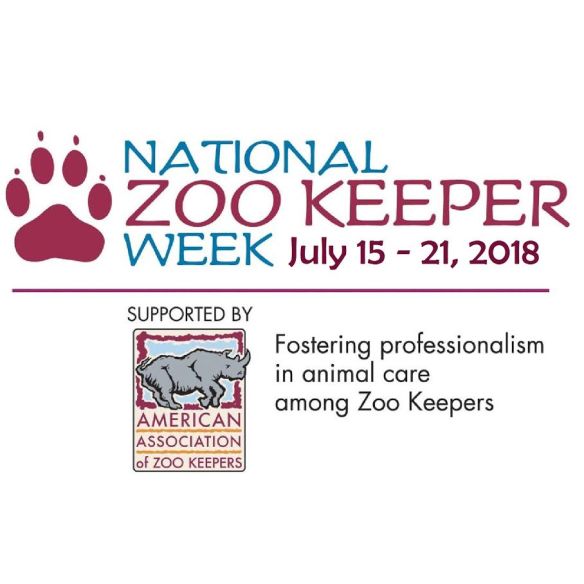
Mission: To recognize and promote dedicated zoo and aquarium professionals year round, culminating in an annual celebration during the third week in July – National Zoo Keeper Week.
Newport Aquarium has twelve biologists that care for all of the fish, reptiles, amphibians, and penguins that have their home here. Care for these animals is more than just simply feeding and giving the animals some attention. They also have a lot of cleaning, food preparation, and maintenance work to do! #NZKW
Training is an important part of the care of many of our animals here at Newport Aquarium. Animals like Mighty Mike and our Sharkrays are target trained. This means that they know to come to a target pole to get their food. This helps the biologists safely work with these animals and ensures that every one of them gets the food they need.
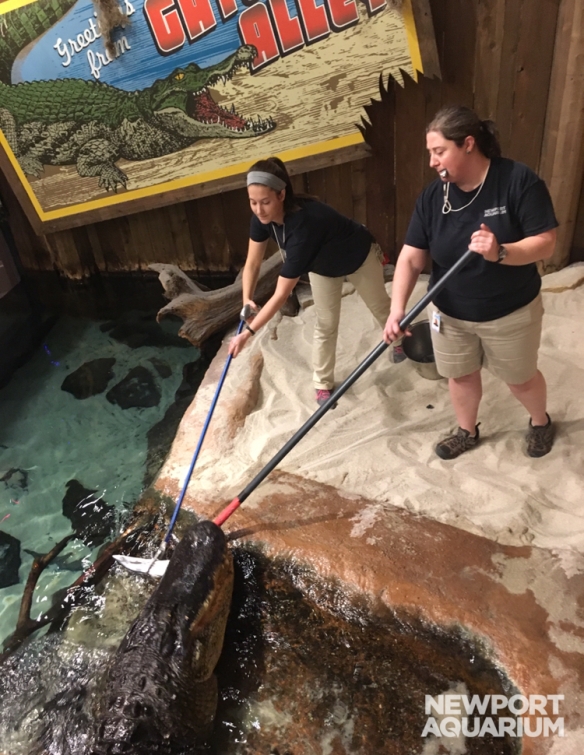
Kelly and Erin target feed Mighty Mike, our 14-foot long, 800-pound alligator.
Our biologists give animals enrichment. Enrichment can be anything from a new object in their space, changing around their furniture, a new scent, sounds of their wild cousins, or a new food item. Our biologists use enrichment all of the time to stimulate our animal’s minds, keep them active, and help our animals engage in natural behaviors.
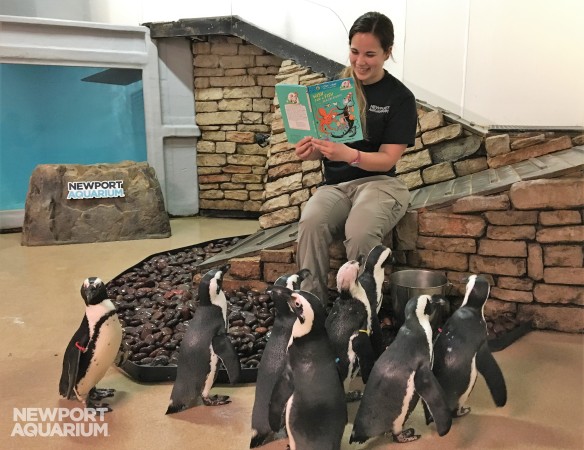
Kristen celebrated Dr. Seuss Day by reading to the penguins.
There are many types of animals at the aquarium, which leads to many types of biologists who care for them. We have biologists who prefer work with the big sharks and those that work with the tiny dwarf seahorses. We have biologists who prefer to work with penguins and those that would rather work with frogs. But whatever our biologists do, they always work as a team to make sure the animals get the best care possible!
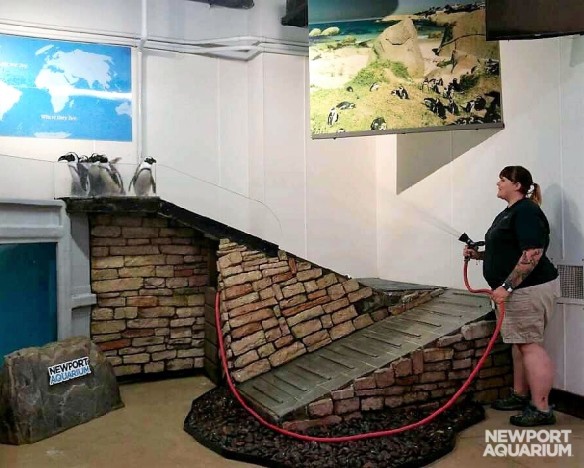
Tamara is one of our resident penguin biologists. Her main job is taking care of our African Penguins. Tamara also works with our outreach reptiles. Tamara says, “My favorite part of my job is learning the different personalities of all of the animals I work with!”
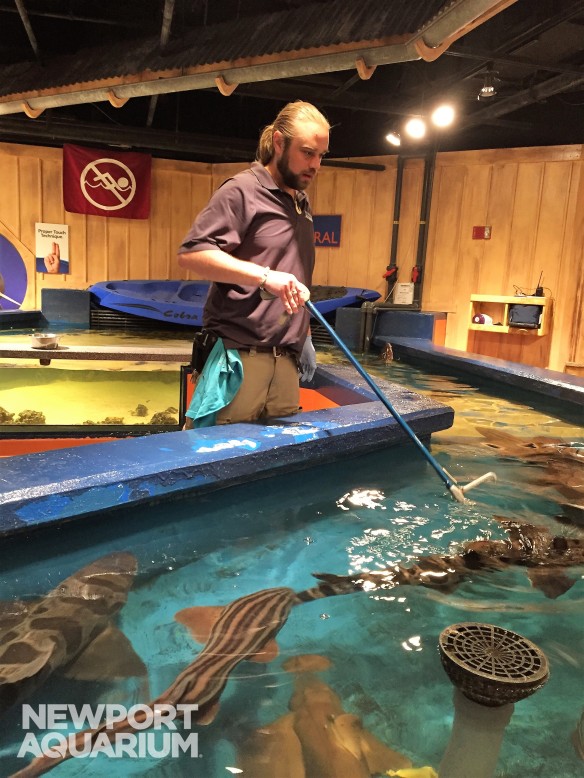
Scott feeds Shark Central in the morning. The sharks like to eat squid.
Scott is a jack of all trades. He is an aquarist, a plumber, and one of the local news station’s favorite interviewees. Scott did our first Takeover Tuesday blog post. One of his favorite tanks to work with is our shark touch tank, Shark Central. “I love working with Shark Central because it has sharks from all over the world.”
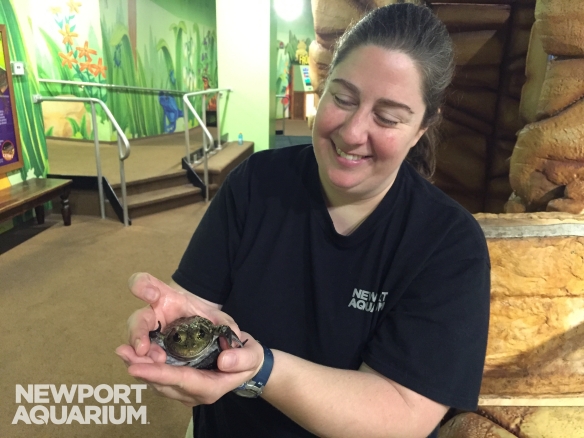 Erin works with our reptile and amphibian collection. We featured Erin in A Day in the Life of a Herpetologist. While she is in charge of the care of our alligators and venomous reptiles, there is a special place in her heart for the frogs of Frog Bog. “Frogs are incredible animals. The way they change from their fish lifestyle as a tadpole to becoming a frog has always fascinated me!” #NZKW
Erin works with our reptile and amphibian collection. We featured Erin in A Day in the Life of a Herpetologist. While she is in charge of the care of our alligators and venomous reptiles, there is a special place in her heart for the frogs of Frog Bog. “Frogs are incredible animals. The way they change from their fish lifestyle as a tadpole to becoming a frog has always fascinated me!” #NZKW

Kristen is one of our new biologists. She was first featured in our Animal Experience Specialist Takeover Tuesday. Because of this, she helps take care of a little bit of everything. “I love that I get to take care of many different kinds of animals. It helps to make every day interesting!”
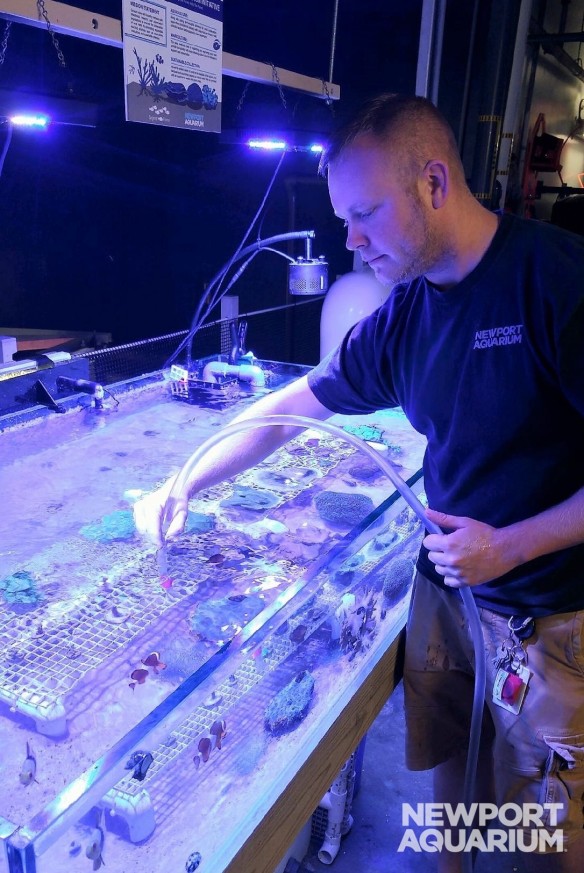 Rob takes care of our live coral tanks. He also helps out in our Seahorse Gallery with the Ribbon Dragons and Dwarf Seahorses. “I love corals because they are colorful, challenging, and confusing to many people. They are a reminder to everyone that the health of our oceans is very important.”
Rob takes care of our live coral tanks. He also helps out in our Seahorse Gallery with the Ribbon Dragons and Dwarf Seahorses. “I love corals because they are colorful, challenging, and confusing to many people. They are a reminder to everyone that the health of our oceans is very important.”
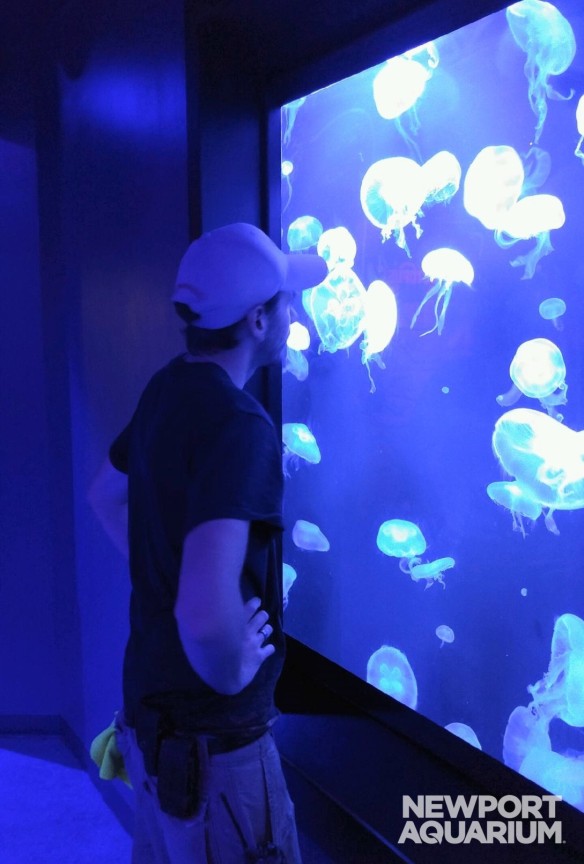
Ty has a passion for the invertebrates at Newport Aquarium. He leads team in the care for Simon the Octopus and the Jellyfish. “My favorite part of working with jellyfish is the culturing and propagation.” Learn more about Ty in his Takeover Tuesday: World of the Octopus Edition.
Health care is always on the mind of a good biologist. Daily observation of the animals helps to spot a problem before it starts. And if the need arises, our biologists work closely with our Vet Team to address any issue.
Our biologists realize that there is more to their work than simply taking care of the animals right in front of them. Conservation is a vital consideration at any aquarium. We at Newport Aquarium play our part as well. Our biologists have taken part in such projects as freshwater mussel studies here in Kentucky and sea turtle headstart programs in North Carolina.
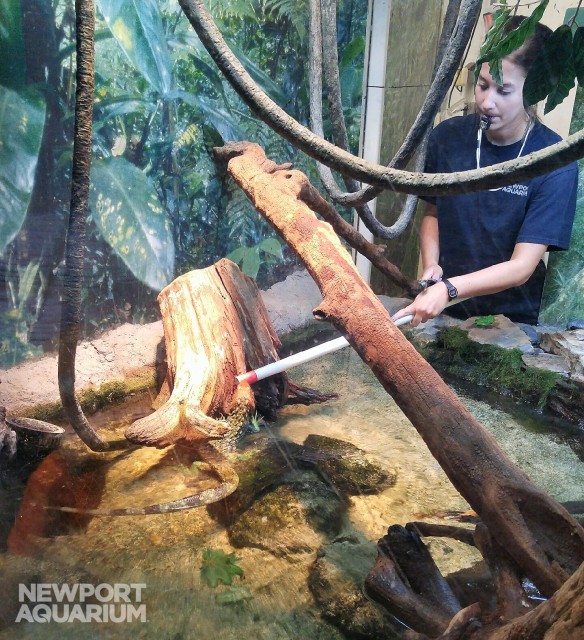
Kelly target trains the caiman lizard.
Kelly helps our reptiles live a happy, healthy life. She knows that training helps the animals get better care and helps to stimulate their minds. She is currently working to train many of our reptiles, including Nester, our caiman lizard. “I feel proud of Nester when he targets correctly. It is very satisfying.”
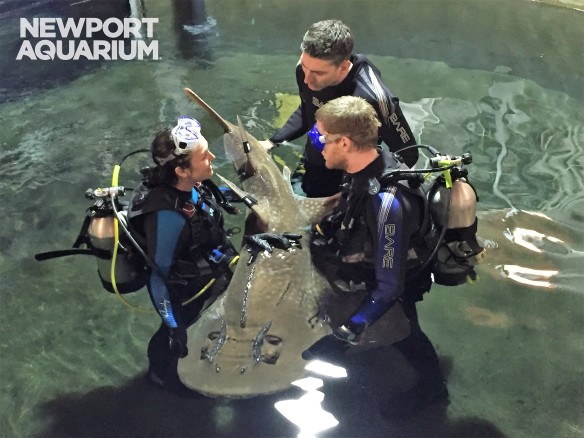
Jen is with one of our shark rays in the acclimation pool.
Jen is an aquarist who works with all of our tunnel systems. This includes her favorite tank, Surrounded by Sharks. She says her favorite part of her job is “definitely the incredible animals she gets to work with!”
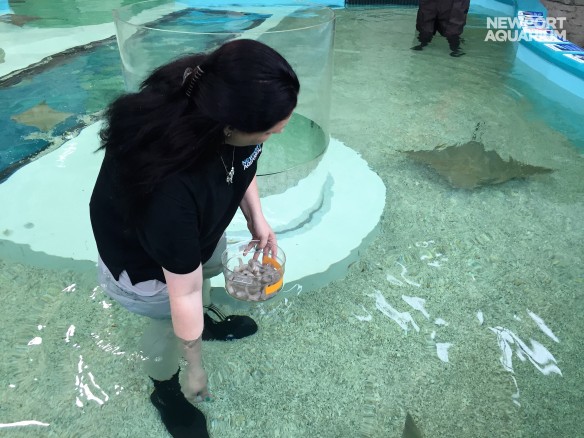
Michelle hand feeds the stingrays in our stingray touch pool.
Michelle spends much of her day caring for our stingrays in Stingray Hideaway, and was featured in a special Takeover Tuesday all about Stingray Hideaway. Because stingrays are so intelligent and curious, she also makes sure they get the enrichment they need to live a stimulating and happy life. “Each stingray interacts with the enrichment in a different way. I love to watch the way each one expresses her own quirks when I give a new enrichment item.”
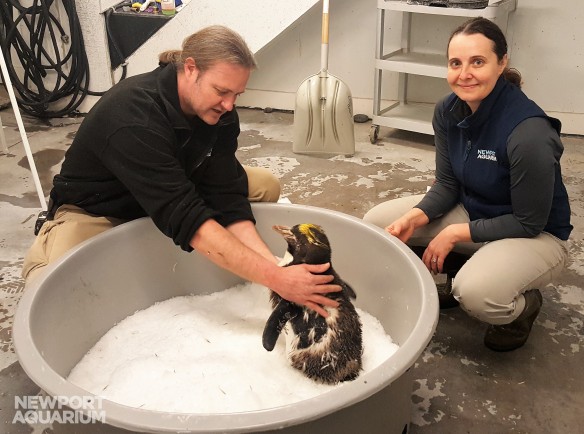
Introducing Victoria to her “snow spa” behind the scenes. It helped her stay cool during her molting process.
Dan is our senior penguin biologist. He spends most of his day cleaning and caring for our cold weather penguins in Penguin Palooza. He’s taking care of Victoria the penguin. He says his favorite part of his job is penguin breeding. “It is challenging to breed them. I get one shot a year and if it doesn’t work, I have to try and figure out why.” Dan also wrote a Takeover Tuesday for World Penguin Day.
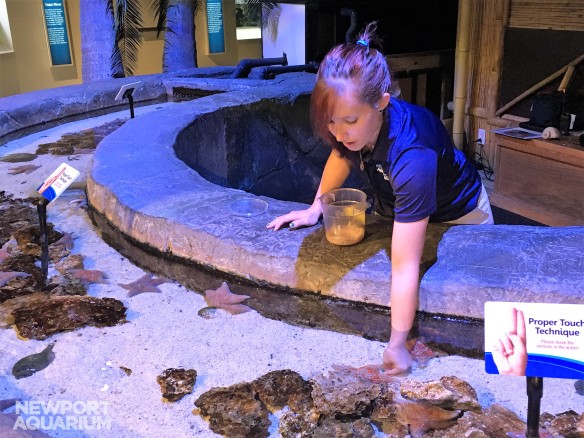 Margaret is an aquarist who works with a variety of saltwater fish. She was featured in a special Tide Pool edition of Takeover Tuesday. She gives her time and talent to the animals that live in our Shore Gallery. “I am currently target training the Snowflake Eels and Trumpet Fish. It is cool to watch them learn and engage with me.”
Margaret is an aquarist who works with a variety of saltwater fish. She was featured in a special Tide Pool edition of Takeover Tuesday. She gives her time and talent to the animals that live in our Shore Gallery. “I am currently target training the Snowflake Eels and Trumpet Fish. It is cool to watch them learn and engage with me.”
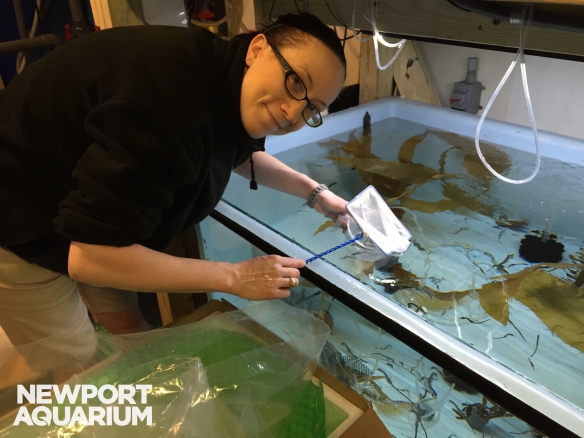 Laurel works closely with our quarantine animals and those that live at our offsite animal health facility. She and the vet team are the first people that our animals encounter before they make their way to the exhibits here at Newport Aquarium. “The best part of this job is bringing animals to people who may never get to see them otherwise. It makes an impact on these people and helps them become more aware of the world and conservation needs.”
Laurel works closely with our quarantine animals and those that live at our offsite animal health facility. She and the vet team are the first people that our animals encounter before they make their way to the exhibits here at Newport Aquarium. “The best part of this job is bringing animals to people who may never get to see them otherwise. It makes an impact on these people and helps them become more aware of the world and conservation needs.”
Thank you for following along and learning more about our talented team of animal care takers. Next time you see one of them,. #ThankAKeeper



















